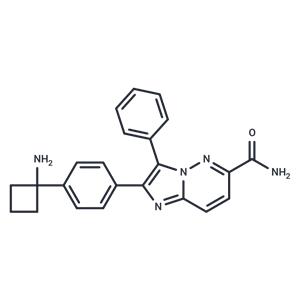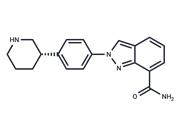| Name | BAY1125976 |
| Description | BAY1125976 is an allosteric inhibitor of Akt1 and Akt2 (IC50s of 5.2 and 18 nM, respectively, in a time-resolved FRET assay) |
| Kinase Assay | The inhibition of five different recombinant AKT proteins (AKT1, ΔPH‐AKT1, AKT2, ΔPH‐AKT2 and AKT3) by BAY 1125976 was assessed by TR‐FRET‐based in vitro kinase assays, which quantify the phosphorylation of the biotinylated peptide biotin‐Ahx‐KKLNRTLSFAEPG (C‐terminus in amide form) by a recombinant kinase enzyme. The ability of BAY 1125976 to inhibit T308 phosphorylation in inactive AKT1 by the upstream kinase PDK1 was measured by a TR‐FRET‐based in vitro kinase assay. To further characterize the interaction of BAY 1125976 with human full‐length active AKT1 and inactive AKT1, as well as a variant lacking the PH domain, surface plasmon resonance spectroscopy (SPR) was performed by a Biacore T100 instrument. |
| Animal Research | Female NMRI (nu/nu) mice s.c. injected with 3 × 10^6/100 μl KPL‐4 breast cancer cells were used to study the mode‐of‐action of BAY 1125976. The treatment was started when tumors reached 232–358 mm^3 in size and the mice received a single oral dose of 25 or 50 mg/kg BAY 1125976. For determination of plasma concentration‐time profiles, blood was drawn from the animals at different time points after compound administration. Analysis of the samples was performed on heparinized plasma after precipitation with acetonitrile by LC/MS/MS. Unbound drug concentrations were calculated from total concentrations and the unbound in vitro fraction in plasma was determined by equilibrium analysis. P‐AKT‐S473 levels in tumor tissue extracts were analyzed with a MULTI‐SPOT Assay System/Phospho (Ser473)/Total Akt Whole Cell Lysate Kit from samples taken 2, 5 and 24 hr after compound administration. These lysates were used in addition for analysis of p‐PRAS40‐T246/total‐PRAS40 and AKT signaling (p‐AKT‐S473, p‐GSK3?‐S9, p‐S6RP‐S240/244 and p‐70S6K‐T389) using respective MULTI‐SPOT Assay Systems. Vehicle‐treated tumors were analyzed to determine the basal level of p‐AKT and used to normalize the amount of p‐AKT relative to vehicle levels. |
| In vitro | In vitro, BAY1125976 inhibited cell proliferation in a broad panel of human cancer cell lines. Particularly high activity was observed in breast and prostate cancer cell lines expressing estrogen or androgen receptors. |
| In vivo | BAY1125976 exhibited strong in vivo efficacy in both cell line and patient-derived xenograft models such as the KPL4 breast cancer model (PIK3CAH1074R mutant), the MCF7 and HBCx-2 breast cancer models and the AKTE17K mutant driven prostate cancer (LAPC-4) and anal cancer (AXF 984) models. Indicate that BAY 1125976 is a potent and highly selective allosteric AKT1/2 inhibitor that targets tumors displaying PI3K/AKT/mTOR pathway activation, providing opportunities for the clinical development of new, effective treatments. |
| Storage | Powder: -20°C for 3 years | In solvent: -80°C for 1 year | Shipping with blue ice. |
| Solubility Information | DMSO : 5 mg/mL (13.04 mM), Sonication is recommended.
|
| Keywords | inhibit | Inhibitor | Protein kinase B | Akt | BAY1125976 | BAY 1125976 | PKB | BAY-1125976 |
| Inhibitors Related | Ethyl gallate | Oridonin | Capivasertib | SKLB-163 | Scutellarin | Methyl-Hesperidin | Artemisinin | Honokiol | (E)-Akt inhibitor-IV | 2,3-Butanediol | MK-2206 dihydrochloride | AKT Kinase Inhibitor |
| Related Compound Libraries | Bioactive Compound Library | Kinase Inhibitor Library | Anti-Cancer Clinical Compound Library | Antioxidant Compound Library | Drug Repurposing Compound Library | Inhibitor Library | Anti-Aging Compound Library | Bioactive Compounds Library Max | Anti-Cancer Drug Library | Anti-Cancer Active Compound Library |

 United States
United States



